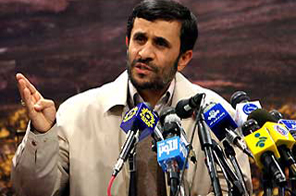Defiant Iran accelerates nuke program
TEHRAN: Iran began enriching uranium to a higher level Tuesday over the vociferous objections of the U.S. and its allies who fear the process could eventually be used to give the Islamic republic nuclear weapons.
State television announced that the process began in the presence of inspectors from the U.N. nuclear watchdog agency. Uranium has to be enriched to fuel nuclear power plants and Iran needs the 20 percent enriched fuel for a research reactor producing medical isotopes.
Enriching uranium to 90 percent, however, creates the material for nuclear weapons, which many countries are afraid Iran is seeking. Iran denies the charge.
France and the U.S. said Monday Iran's action left no choice but to push harder for a fourth set of U.N. Security Council sanctions to punish Iran's nuclear defiance. Russia, which has close ties to Iran and has opposed new sanctions, appeared to edge closer to Washington's position, saying the new enrichment plans show the suspicions about Iran's intentions are well-founded.
In effort to defuse the crisis, the International Atomic Energy Agency brokered a deal last year in which Iran would ship out its low enriched uranium to be processed abroad and returned a year later.
Iran initially rejected the deal, then later said that if an acceptable alternative could be reached, it would not continue the high level enriching process.
Ali Akbar Salehi, a vice president as well as the head of the country's nuclear program, said the further enrichment would be unnecessary if the West found a way to provide Iran with the needed fuel.
"Whenever they provide the fuel, we will halt production of 20 percent," he told state TV late Monday.
Iran has so far enriched uranium to a level of 3.5 percent, which is suitable for use in fueling nuclear power plants.
On Tuesday, the spokesman of Iran's Foreign Ministry, Ramin Mehmanparast said any plan by the West to impose new Security Council resolutions would not be helpful.
"If they attempt another resolution, they are making a mistake. It is not helpful in resolving the nuclear dispute between Iran and the West," he said. "They are completely wrong if they think our people will back down even a single step."
Salehi said Iran has been trying to buy the higher enriched fuel for its research reactor for the past several months, but the West made providing the fuel conditional on Iran's acceptance of the U.N.-drafted agreement to ship its uranium stockpile abroad first.
That plan would come with some safeguards, because the enriched fuel provided to Iran would be in a form that would be difficult to further process to make weapons.
According to the report on state TV, the higher level enrichment began after Iranian scientists injected 25 kilograms of 3.5 percent enriched UF6, or Uranium hexafluoride, gas into a cascade of 164 centrifuge machines at a laboratory in central town of Natanz, some 150 miles south of Tehran.
The machines are expected to produce some 2.5 kilograms of 20 percent enriched uranium out of 25 kilograms of gas every month, according to the report.
It said inspectors from the International Atomic Energy Agency were present during the injection.
When asked about the enrichment process, Gill Tudor of the IAEA only said that the agency had inspectors at the site already.
"The agency continues to have inspectors in Iran conducting normal safeguard operations," Tudor said.
Pentagon spokesman Geoff Morrell said U.S. Defense Secretary Robert Gates believed the United Nations should slap new sanctions on Iran in "weeks, not months."
Morrell said Gates believes a U.N. resolution would lay the legal groundwork countries need to impose sanctions independently and pressure Iran to abandon its nuclear program.
No new U.N. Security Council sanctions can be passed, however, without unanimous agreement from all members, including China, which has been reluctant to impose new punitive measures on Iran.
China called for more talks on Tuesday, with Foreign Ministry spokesman Ma Zhaoxu, saying "I hope the relevant parties will step up efforts and push for progress in the dialogue and negotiations."
Russia, another Security Council member, has also been reluctant to back new sanctions.
The nation's security chief said on Tuesday, however, that Iran's decision to enrich uranium to higher levels has added to doubts about its nuclear program.
"Iran says it doesn't want to have nuclear weapons. But its actions, including its decision to enrich uranium to 20 percent, have raised doubts among other nations, and these doubts are quite well-founded," Nikolai Patrushev was quoted as saying by Russian news agencies.
Iran says it needs the 20 percent enriched fuel for a research reactor producing radio isotopes to treat cancer and manufacture radiography materials. Iran says more than 850,000 people need the products for their illnesses.






